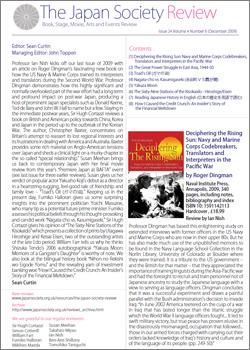Issue 24 (December 2009, Volume 4, Number 6)

Professor Ian Nish kicks off our last issue of 2009 with an article on Roger Dingman’s fascinating new book on how the US Navy & Marine Corps trained its interpreters and translators during the Second World War. Professor Dingman demonstrates how this highly significant and normally overlooked part of the war effort had a long term and profound impact on post-war Japan, producing a host of prominent Japan specialists such as Donald Keene, Ted de Bary and John W. Hall to name but a few.
Staying in the immediate postwar years, Sir Hugh Cortazzi reviews a book on British and American policy towards China,Korea and Japan in the period up to the outbreak of the Korean War. The author, Christopher Baxter, concentrates on Britain’s attempt to reassert its lost regional interests and its frustrations in dealing with America and Australia. Baxter provides some rich material on Anglo-American tensions over Japan and sheds a clinical light on a murky chapter in the so called “special relationship.”
Susan Meehan brings us back to contemporary Japan with her final movie review from this year’s “Premiere Japan at BAFTA” event (see last issue for three earlier reviews). Susan gives us her verdict on popular actor Yakusho Koji’s debut as a director in a heartstring-tugging, feel-good tale of friendship and family love – “Toad’s Oil (ガマの油).”
Keeping us in the present day, Fumiko Halloran gives us some surprising insights into the prominent politician Yoichi Masuzoe, who many tip as a potential future prime minister. Fumiko assesses his political beliefs through his thought-provoking and candid work “Nagata-cho vs. Kasumigaseki.”
Sir Hugh Cortazzi gives his opinion of “The Sixty-Nine Stations of the Kisokaido” which presents a collection of prints by Utagawa Hiroshige and Keisai Eisen, two of the outstanding artists of the late Edo period.
William Farr tells us why he thinks Shizuka Tendo’s 2006 autobiographical “Yakuza Moon: Memoirs of a Gangster’s Daughter” is worthy of note.
We also look at the bilingual history book “Nihon no Rekishi wo Eigode Yomu” and the revealing yarn of investment banking woe “How I Caused the Credit Crunch: An Insider’s Story of the Financial Meltdown.”
Contents
- Deciphering the Rising Sun: Navy and Marine Corps Codebreakers, Translators and Interpreters in the Pacific War
- The Great Power Struggle in East Asia, 1944-50
- Toad’s Oil (ガマの油)
- Nagata-cho vs. Kasumigaseki (永田町VS霞が関)
- Yakuza Moon
- The Sixty-Nine Stations of the Kisokaido - Hiroshige/Eisen
- Reading Japanese History in English (日本の歴史を英語で読む)
- How I Caused the Credit Crunch: An Insider’s Story of the Financial Meltdown
Contributors
Editor
Sean Curtin
Managing Editor
John Toppon
Reviewers
Ian Nish, Sir Hugh Cortazzi, Susan Meehan, Fumiko Halloran, William Farr, Sean Curtin and Natasha Hamilton

